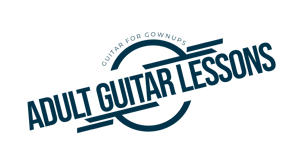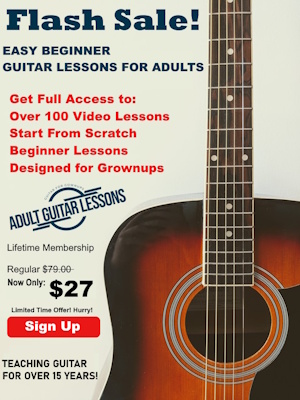Try this. Google “God”. Just for laughs, go to Google and type in G-O-D. Now, pay attention to the drop down menu below. This is where Google’s intuitive machine suggests the most popular sites that are most likely to match the search term you have entered.
When you enter a search for God, what is the number one recommended match for your search?….GoDaddy!
Now don’t get me wrong, I’m a big fan of GoDaddy, and a customer as well – but if I’m looking for God, I don’t expect to find him at GoDaddy.
And, yes, I know what the first three letters in GoDaddy are, but doesn’t it strike you odd that this site comes up in the number one slot before any God related sites?
This is a telling commentary on life in today’s ultra technical age. If a search for God can lead us directly to a domain registration site, how can we be sure that any information we are searching for will lead us to the “right” information.
What does this have to do with playing guitar? Do a Google search for the term “A chord”. As of this writing, a search for “A chord” will return 5.3 million sites! Yes, that’s “million”.
Is it conceivable that there are 5.3 million ways to show you how to play an A chord? How can we possibly know which one of those millions of sites will show us the “correct” way to play an A chord?
Have you heard the term “Google guitar player”? This endearing term refers to today’s generation of would-be guitarists that hop around from site to site, grabbing bits and pieces of YouTube videos, free lessons and blog posts – all under the assumption that they are actually “learning” how to play guitar.
The problem is, of course, that although this generation of “Google guitar players” often does learn how to play little snippets of songs, licks and riffs; they rarely gain a full grasp on guitar playing techniques and concepts that take them the level of truly becoming an accomplished guitar “player”.
Those of us in the “baby boomer” generation have had the unique opportunity to witness a world that has changed rapidly, maybe more so than any other generation in history.
We can still recall the Kennedy assassination, and a time when landing on the moon was a “distant goal”. We remember only having the big three TV stations, when we had to adjust the rabbit ears on our black & white sets. Back when our phones had rotary dials and were connected with wires.
We can almost track our journey into the information age according to what medium we listened to our music on. In the 60’s we had vinyl records and listened to scratchy transistor radios tuned to AM stations. In the 70’s we saw the onslaught of 8-track tapes. Then cassette tapes took over and dominated, only to be trounced by CD’s. Now the impetus of MP3’s, downloads and ipod’s are slowly sending CD’s the way of dinosaurs.
The guitar learning methods of our generation were dramatically different back in those days as well. In the 70’s, when I first picked up a guitar, there was no Internet, no video lessons, TAB’s were not in use, no animated guitar graphics, no on-line tuners, and no DVD’s.
We basically had two choices. Take lessons from a private instructor, or learn to play guitar on your own. Most of us did the latter.
Back then you learned to play guitar hunched over a turntable, carefully placing the needle on a vinyl record to listen to a passage, then lifting the needle and trying to figure out how to play what you just heard. Then repeating the process – over and over and over – until you could play the song, or until the record was scratched beyond recognition.
Using this method we learned the licks of Clapton, Hendrix, Zeppelin, Beck and Santana – and we became accomplished guitar players by means of intensely “focusing” on one thing at a time. We had no choice, no other options and no distractions.
There are, admittedly, numerous advantages to today’s information age. But how much information is “too much”, and when do you cross the line into “information overload”, which can result in the brain digesting no real information?
To today’s “Google guitarist” – if you’re feeling overwhelmed, if you’ve been trying to learn guitar by jumping all over the net, if you’re feeling frustrated at the lack of progress – there’s one word you should write in bold letters and tape to the wall…FOCUS.
That’s really the main difference between the “old school” method of learning guitar and the new one. The sheer volume of information available at your finger tips makes the ability to “focus” on any one thing, for any length of time, a major challenge.
If you truly have the desire to become an accomplished guitarist, choose your path, and stick with it. Whether it’s an on-line lessons program, a home study DVD course, private instruction or music books – spend all of your time and energy focusing on that one course of action.
Developing the ability to “focus” with tunnel vision, putting on blinders to the rest of the digital world – will take you down a sure path from being a “Google guitar player” to becoming a “real” guitar player!



